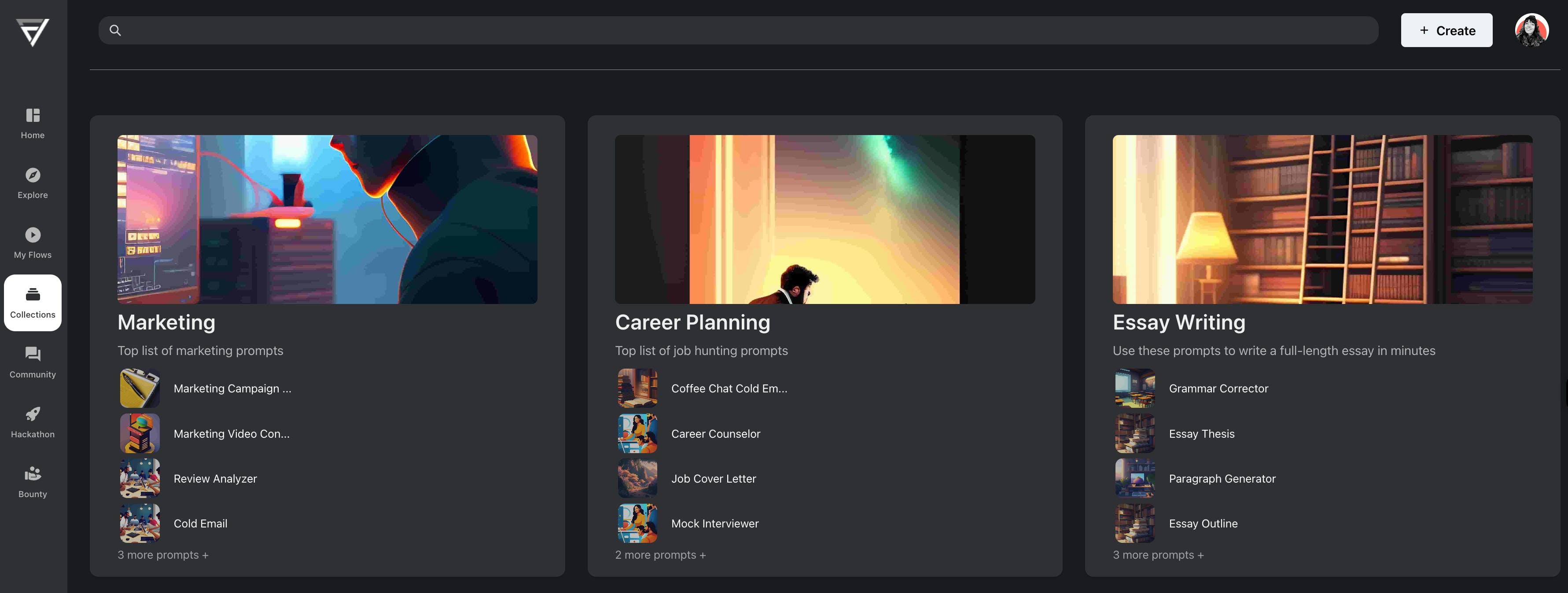Ever wanted to quit your day job or drop out of school to work full-time on building things?
Former UC Berkeley computer science student and maker Jay Dang did exactly that: dropped out to commit full-time to working on Flow GPT. We gave Jay a call to chat about big decisions, big ideas, and big opportunities.
Summary:
- The initial idea for Flow GPT was to create a platform Jay thought of as “Product Hunt for prompts,” but after talking to users he gained from launching on Product Hunt, Jay pivoted the platform to look and feel more like a “GitHub for prompts.”
- The monetization strategy for Flow GPT is not based on selling prompts, but rather, for example, on charging for access to features that help users manage or create prompts.
- The focus for the future of Flow GPT is on building a creator tools ecosystem and community for ChatGPT prompt creators to collaborate, create, and share their prompts with each other.
- Jay believes anyone who writes and shares prompts can be considered a prompt engineer. He suggests that being a good prompt creator involves trying different things, learning from others, and understanding the problems they're trying to solve.
PH: Let’s dive in with a basic introduction to who you are, and where you're at in your journey with Flow GPT at the moment.
Jay: Yeah, sure, so I was a second year CS major at UC Berkeley. And I was always a frequent visitor to Product Hunt, always wanting to ship something. In my spare time, I think I built like four different side projects, just to try it out.
When I decided to finally launch on Product Hunt, it just happened to be with Flow GPT, and my launch got really good traction and traffic.
I acquired 14K new users in the first week after launching, after achieving 3rd Product of the Day, and then 3rd Product of the Week.
Shortly after that, I decided to drop out and work on Flow GPT full-time.
How did your parents react to your decision to leave school?
They were not happy. But we talked about it for hours, and eventually they agreed.
How did you form the initial idea for Flow GPT?
I realized there’s a growing group of really good prompt creators who are passionate about and talented at defining problems, essentially.
These prompt creators or “prompt engineers” are not necessarily programmers, but they are similar software engineers, in that they have the desire for an open-source-style community like Github to help them to collaborate, work with, and learn from each other.
Actually, the first version was inspired by and designed to look and function exactly like Product Hunt, but for prompts. I just felt people have a similar desire to explore and share their generative AI prompts like they’re products, and just kinda “look around.” So the original UI, the design is very similar to Product Hunt.

After I shipped that, I talked to more users to try to understand them and figure out the real need here. As a result of that process, Flow GPT is now more like a Github for prompts.
What are your biggest challenges right now?
There are a lot of new challenges, mostly because this is an entirely new form of content.
Prompts are different from videos, or products, or blogs. We don't think of prompts as a commodity.
So regarding monetization, for example, I initially thought creators can earn based on usage on the prompts they create, but that brings a lot of problems, like copyright issues. Prompts aren't the product. We won’t charge based on usage or access to prompts, but rather for advanced features that help you better use and manage prompts, for example.
What are your thoughts on the term prompt engineer? Is that title exclusive in any way or do you think it should be applied to anybody who is creating and sharing prompts?
Jay: I think everyone who is using generative AI right now is a prompt engineer. But I do think to be really good at creating prompts, you have to be really good at understanding problems. And you have to be willing to tweak and experiment, and try lots of different things.
You’ve always got to be evaluating the results against your prompts, figuring out what worked and what didn’t. And of course, the best way to get better at prompting is to share and collaborate on prompts with others.
Do you have any tips for fellow and aspiring makers?
If you have something that really takes off, and there's little to no cost for you, think about committing to it, full-time.
There’s so much opportunity right now. Especially in AI.
Get access to a company with access to unique data sets and train a new large language model, for example. BloombergGPT is an example of what I mean here. I think, in the future, there’ll be a lot of different LLMs, unique to every industry.
Like I said, there’s so much opportunity right now. And you can always go back to school.
Got a maker story worth sharing? Pitch content@producthunt.co.

